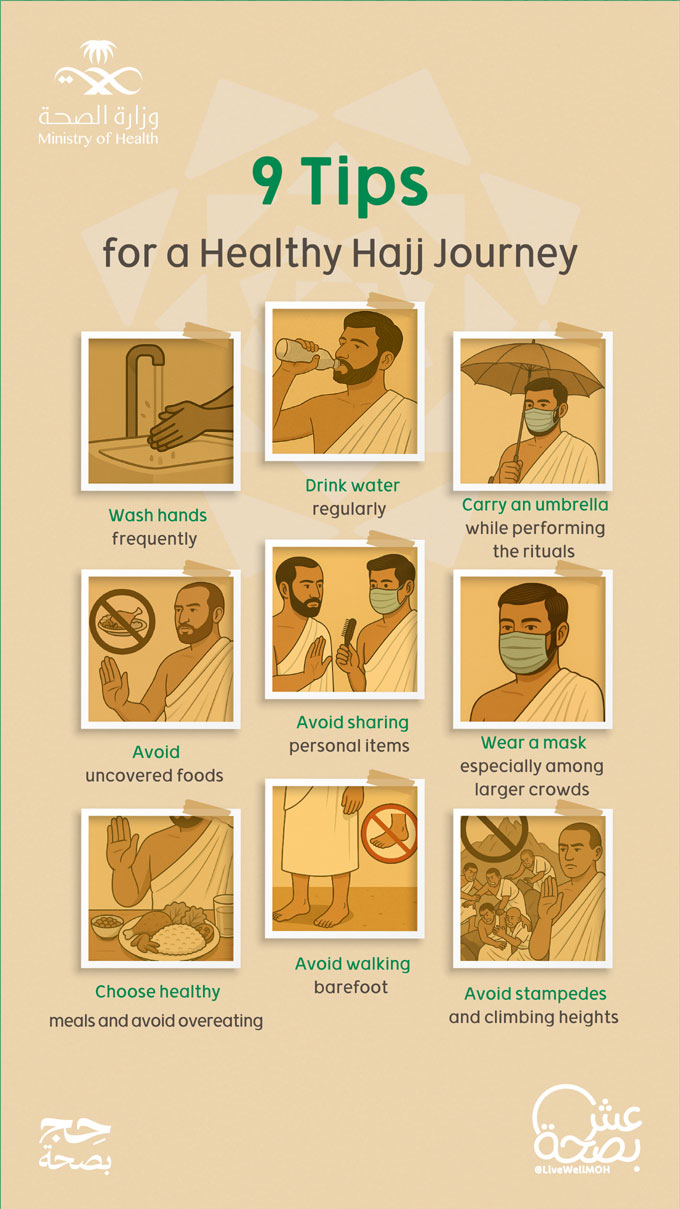Hajj is one of the world’s largest and most spiritually profound gatherings, drawing millions of pilgrims from across the globe. With such vast numbers in close proximity, it is essential for pilgrims to prioritise their health and safety to fully engage in the spiritual purpose of the journey.
The Saudi Ministry of Health provides a comprehensive range of services to safeguard the well-being of every pilgrim. It also works closely with the World Health Organization and other international partners to uphold global health standards and best practices.
To help pilgrims make the most of this sacred time, the ministry has outlined 10 important steps for maintaining good health throughout Hajj.
1. Ensure your vaccines are up to date: The Ministry of Health recommends that all pilgrims ensure they are vaccinated before undertaking Hajj. Required vaccines include meningitis, influenza, and Covid-19 to help minimise the risk of spreading infectious diseases. Pilgrims are encouraged to register on the Sehhaty platform, a digital health app that verifies vaccination status and facilitates entry into Saudi Arabia.
2. Pack personal products to stay healthy: It’s important for pilgrims to pack a personal bag with essentials, given the long walks and crowded areas. Personal hygiene products, a prayer mat, rosary, hand sanitizer, sunscreen, an umbrella, and basic toiletries such as a toothbrush and towel are vital for both comfort and spiritual focus.
3. Visit a doctor before Hajj: It’s important to review your health status with a physician to check whether you’re physically prepared for the demands of Hajj and manage any existing health conditions.
4. Take advantage of wearable tech and digital health services: Monitor and manage your health during Hajj through the Sehhaty and Tawakkalna apps, which offer health services, appointment booking, and real-time alerts. Wearable health trackers are provided to high-risk pilgrims for monitoring vital signs in real time for early detection and treatment.
5. Stay hydrated and protect yourself against the sun: Avoid direct sun exposure, stay in shaded areas, use sunscreen, and carry an umbrella. Staying well-hydrated by drinking plenty of water and fluids is essential. Smart crowd-control systems are in place in Makkah to ease congestion and reduce the risk of incidents such as heatstroke or stampedes. Shaded walkways, water misting systems, and access to drinking water are available throughout the route. In addition, mobile clinics and medical teams are strategically stationed to provide rapid assistance for heat-related conditions.
6. Practice sanitation: Keeping your hands clean is one of the simplest and most effective ways to stay healthy. Pilgrims are encouraged to wash or sanitise their hands regularly. To support hygiene, common areas in Makkah are continuously sanitised and air-conditioned tents provide a cleaner, more comfortable environment. Additionally, waste is carefully managed by authorities to help prevent the spread of disease.
7. Eat healthy: To stay healthy and avoid illness or fatigue during Hajj, it is important to eat simple and nutritious foods such as whole grain bread, fruits, milk, or yogurt to receive essential nutrients. Staying hydrated by drinking plenty of water and natural juices is also key. It is best to limit salty foods and energy-boosting drinks like coffee, which can contribute to dehydration and high blood pressure.
8. Be mindful of food safety guidelines: To prevent gastrointestinal infections, pilgrims should check expiration dates and avoid uncovered or poorly stored food. The Saudi Food and Drug Authority ensures the safety of food and medical products during Hajj by inspecting entries at air, land, and seaports, and monitoring facilities in Makkah, Madinah, and seasonal healthcare centers in coordination with the Ministry of Health.
9. Consider using face masks to avoid respiratory infections: In crowded areas, it’s advisable to wear masks to protect against respiratory infections. The emergency hospital at the Grand Mosque is well-equipped with intensive care units, medical laboratories, radiology services, an in-house pharmacy, and isolation units for infectious diseases.
10. Inform authorities of illness: If you experience signs of infection or a skin rash, it’s important to keep your distance from others and immediately inform the relevant authorities. To strengthen emergency medical response during the Hajj season, the Saudi Red Crescent Authority has set up two helipads at the Grand Mosque. These helipads facilitate rapid medical evacuations, enabling critical cases to be swiftly transferred to specialized hospitals within minutes.
In case of any health emergency, please call 937, the Ministry of Health’s 24/7 helpline for immediate medical support. - TradeArabia News Service








